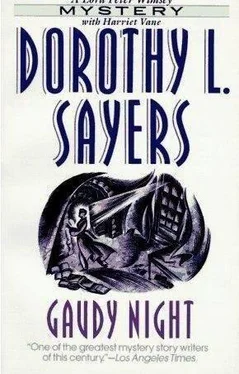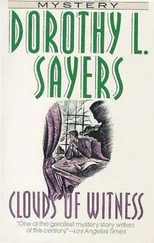Dorothy Sayers - Gaudy Night
Здесь есть возможность читать онлайн «Dorothy Sayers - Gaudy Night» весь текст электронной книги совершенно бесплатно (целиком полную версию без сокращений). В некоторых случаях можно слушать аудио, скачать через торрент в формате fb2 и присутствует краткое содержание. Жанр: Детектив, на английском языке. Описание произведения, (предисловие) а так же отзывы посетителей доступны на портале библиотеки ЛибКат.
- Название:Gaudy Night
- Автор:
- Жанр:
- Год:неизвестен
- ISBN:нет данных
- Рейтинг книги:4 / 5. Голосов: 2
-
Избранное:Добавить в избранное
- Отзывы:
-
Ваша оценка:
- 80
- 1
- 2
- 3
- 4
- 5
Gaudy Night: краткое содержание, описание и аннотация
Предлагаем к чтению аннотацию, описание, краткое содержание или предисловие (зависит от того, что написал сам автор книги «Gaudy Night»). Если вы не нашли необходимую информацию о книге — напишите в комментариях, мы постараемся отыскать её.
Gaudy Night — читать онлайн бесплатно полную книгу (весь текст) целиком
Ниже представлен текст книги, разбитый по страницам. Система сохранения места последней прочитанной страницы, позволяет с удобством читать онлайн бесплатно книгу «Gaudy Night», без необходимости каждый раз заново искать на чём Вы остановились. Поставьте закладку, и сможете в любой момент перейти на страницу, на которой закончили чтение.
Интервал:
Закладка:
“Surely,” said Miss Burrows, “it is far more likely to be one of the scouts than one of ourselves. I can scarcely imagine that a member of this Common Room would be capable of anything so disgusting. Whereas that class of persons-”
“I think that is a very unfair observation,” said Miss Barton. “I feel strongly that we ought not to allow ourselves to be blinded by any sort of class prejudice.”
“The scouts are all women of excellent character, so far as I know,” said the Bursar, “and you may be sure that I take very great care in engaging the staff. The scrubbing-women and others who come in by the day are, naturally, excluded from suspicion. Also, you will remember that the greater number of the scouts sleep in their own wing. The outer door of this is locked at night and the ground-floor windows have bars. Besides this, there are the iron gates which cut off the back entrance from the rest of the college buildings. The only possible communication at night would be by way of the buttery, which is also locked. The Head Scout has the keys. Carrie has been with us fifteen years, and is presumably to be trusted.”
“I have never understood,” said Miss Barton, acidly, “why the unfortunate servants should be locked up at night as though they were dangerous wild beasts, when everybody else is free to come and go at pleasure. However as things are, it seems to be just as well for them.”
“The reason, as you very well know,” replied the Bursar, “is that there is no porter at the tradesmen’s entrance, and that it would not be difficult for unauthorized persons to climb over the outer gates. And I will remind you that all the ground-floor windows that open directly upon the street or the kitchen yard are barred, including those belonging to the Fellows. As for the locking of the buttery, I may say that it is done to prevent the students from raiding the pantry as they frequently did in my predecessor’s time, or so I am informed. The precautions are taken quite as much against the members of the college as against the scouts.”
“How about the scouts in the other buildings?” asked the Treasurer. “There are perhaps two or three occupying odd bedrooms in each building,” replied the Bursar. “They are all reliable women who have been in our service since before my time. I haven’t the list here at the moment; but I think there are three in Tudor, three or four in Queen Elizabeth, and one in each of the four little dormer rooms in the New Quad. Burleigh is all students’ rooms. And there is, of course, the Warden’s own domestic staff, besides the Infirmary maid who sleeps there with the Infirmarian.”
“I will take steps,” said Dr. Baring, “to make sure that no member of my own household is at fault. You, Bursar, had better do the same by the Infirmary. And, in their own interests, the scouts sleeping in College had better be subjected to some kind of supervision.”
“Surely, Warden-” began Miss Barton, hotly.
“In their own interests,” said the Warden, with quiet emphasis. “I entirely agree with you, Miss Barton, that there is no greater reason for suspecting them than for suspecting one of ourselves. But that is the more reason why they should be cleared completely and at once.”
“ By all means,” said the Bursar.
“As to the method used,” went on the Warden, “to keep check upon the scouts, or upon anybody else, I feel strongly that the fewer people who know anything about that, the better. Perhaps Miss Vane will be able to put forward a good suggestion, in confidence to myself, or to…”
“Exactly,” said Miss Hillyard, grimly. “To whom? So far as I can see, nobody among us can be taken on trust”
“That is unfortunately quite true,” said the Warden, “and the same thing applies to myself. While I need not say that I have every confidence in the senior members of the College, both jointly and severally, it appears to me that, exactly as in the case of the scouts, it is of the highest importance that we should be safeguarded, in our own interests. What do you say, SubWarden?”
“Certainly,” replied Miss Lydgate. “There should be no distinction made at all. I am perfectly willing to submit to any measures of supervision that may be recommended.”
“Well, you at least can scarcely be suspected,” said the Dean. “You are the greatest sufferer.”
“We have nearly all suffered to some extent,” said Miss Hillyard.
“I am afraid,” said Miss Allison, “we shall have to allow for what I understand is the well-known practice of these unfortunate-um, anonymous-letter writers, of sending letters to themselves to distract suspicion. Isn’t that so, Miss Vane?”
“Yes,” said Harriet, bluntly. “It seems unlikely, on the face of it, that anybody would do herself the kind of material damage Miss Lydgate has received; but if we once begin to make distinctions it is difficult to know where to stop. I don’t think anything but a plain alibi ought to be accepted as evidence.”
“And I have no alibi,” said Miss Lydgate. “I did not leave College on the Saturday till after Miss Hillyard had gone to lunch. What is more, I went over to Tudor during lunchtime, to return a book to Miss Chilperic’s room before I left; so that I might quite easily have taken the manuscript from the Library then.”
“But you have an alibi for the time when the proofs were put in the S.C.R.,” said Harriet.
“No,” said Miss Lydgate; “not even that. I came by the early train and arrived when everybody was in Chapel. I should have had to be rather quick to run across and throw the proofs into the S.C.R. and be back in my rooms again before the discovery was made; but I suppose I could have done it. In any case, I would much rather be treated on the same footing as other people.”
“Thank you,” said the Warden. “Is there anybody who does not feel the same?”
“I am sure we must all feel the same,” said the Dean. “But there is one set of people we are overlooking.”
“The present students who were up at the Gaudy,” said the Warden. “Yes; how about them?”
“I forget exactly who they were,” said the Dean, “but I think most of them were Schools people, and have since gone down. I will look up the lists and see. Oh, and, of course, there was Miss Cattermole who was up for Responsions-for the second time of asking.”
“Ah,” said the Bursar. “Yes. Cattermole.”
“And that woman who was taking Mods-what’s her name? Hudson, isn’t it? Wasn’t she still up?”
“Yes” said Miss Hillyard, “she was.”
“They will be in their Second and Third Years now, I suppose,” said Harriet. “By the way, is it known who ‘young Farringdon’ is, in this note addressed to Miss Flaxman?”
“There’s the point,” said the Dean. “Young Farringdon is an undergraduate of- New College, I think it is-who was engaged to Cattermole when they both came up, but is now engaged to Flaxman.”
“Is he, indeed?”
“Mainly, I understand, or partly, in consequence of that letter. I am told that Miss Flaxman accused Miss Cattermole of sending it and showed it to Mr. Farringdon; with the result that the gentleman broke off the engagement and transferred his affections to Flaxman.”
“Not pretty,” said Harriet.
“No. But I don’t think the Cattermole engagement was ever anything much more than a family arrangement, and that the new deal was not much more than an open recognition of the fait accompli. I gather there has been some feeling in the Second Year about the whole thing.”
“I see,” said Harriet.
“The question remains,” said Miss Pyke, “What steps do we propose to take in the matter? We have asked Miss Vane’s advice, and personally I am prepared to agree-particularly in view of what we have heard this evening-that it is abundantly necessary that some outside person should lend us assistance. To call in the police authorities is clearly undesirable But may I ask whether, at this stage, it is suggested that Miss Vane should personally undertake an investigation? Or alternatively, would she propose our placing the matter in the hands of a private inquiry agent? Or what?”
Читать дальшеИнтервал:
Закладка:
Похожие книги на «Gaudy Night»
Представляем Вашему вниманию похожие книги на «Gaudy Night» списком для выбора. Мы отобрали схожую по названию и смыслу литературу в надежде предоставить читателям больше вариантов отыскать новые, интересные, ещё непрочитанные произведения.
Обсуждение, отзывы о книге «Gaudy Night» и просто собственные мнения читателей. Оставьте ваши комментарии, напишите, что Вы думаете о произведении, его смысле или главных героях. Укажите что конкретно понравилось, а что нет, и почему Вы так считаете.












